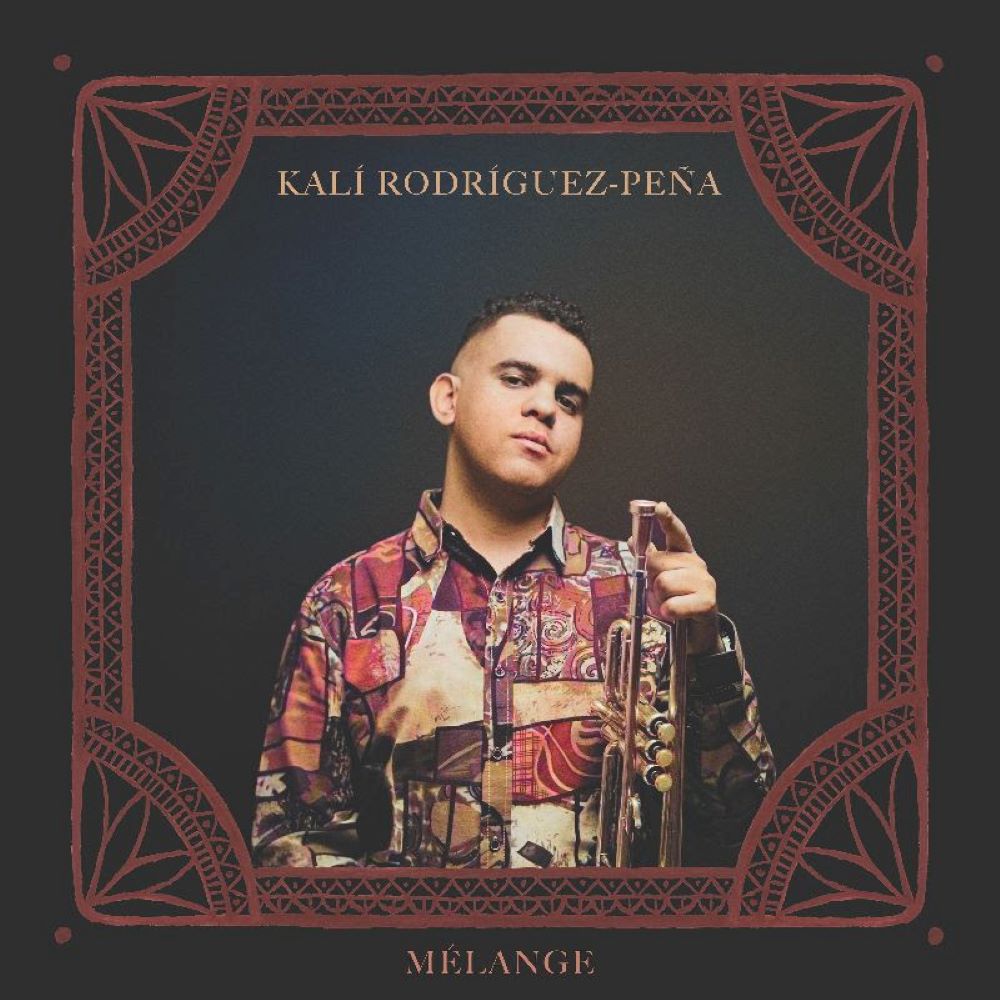Trumpeter and composer Kalí Rodríguez-Peña blurs the lines between genres as he pays homage to the 21st-century mindset with his hard-grooving debut, Mélange, out March 4, 2022 via Truth Revolution Records
Trumpeter and composer Kalí Rodríguez-Peña has become a steadfast part of the New York music scene. From his upbringing in Cuba to his time at the Manhattan School of Music, from his open-minded approach to the concept of genre to his clear vision of musicality as a bandleader, Kalí has a determination, a passion, and an optimism in his music that dance and flow around each other like the audiences to whom he plays once his melodies enter the air. Now, after leading the consistent entourage he’s proud to call his band and musical family over the past five years, Kalí deemed it high time to step into the studio and capture the vivacious interplay and unpredictably joyous musical discourse that has so enraptured his live listeners over the previous half-decade. With musical influences that reach far beyond the Americas and a perspective on music that remains grounded in tradition yet distinctly relevant to the present, Kalí is proud to release Mélange on March 4, 2022 on Truth Revolution Records.
Like many of the musicians who come to New York and thrive, Kalí found that the experience of adapting and learning to understand the monumental city and its plethora of nuance was one that was defining. “Coming to New York,” Kalí tells, “I wanted to grasp all the knowledge I could about the city, its people, and its culture.” During his drive for knowledge, Kalí quickly saw a striking similarity to Havana, where he had previously lived in Cuba: everyone was fighting in their own way for a chance to make it every day. As he spent more time in New York, this became one of the driving factors that led him to empathize with and understand the bustling city around him, and it is in this common ground that connected him both to the music and the wider world. It was these experiences and these lessons from the city that began to inspire him and, ultimately, the music he would create. “Each song was inspired by an experience, a story, and life lesson,” Kalí says, “So I [can] say that the music aims to be descriptive, and even autobiographical.”
The title of the album, Mélange, is taken from the French word for “mixture,” and was chosen by Kalí as an apt way to succinctly understand the music that has brought him to where he now is, as well as how he sees his music as positioned in the present. Drawing from bebop and post-bop; Cuban timba, salsa, and rumba; and world music from India and the Caribbean, Mélange truly does stand by its translated definition and creates an eclectic yet seamless blend of musical traditions and heritages that, when combined, shine with a mosaic ebullience. In addition to representing the blend of traditions present on the album, Mélange also embodies Kalí’s unique perspective on music and its reception in the present. “The way most people listen to music today – the playlist – is a mélange of different albums and artists,” explains Kalí. “By doing this, one’s mind eventually blurs what we call genres, and starts associating different styles of music as choices of how to combine notes and rhythms.” Kalí’s view has led him, both in performance and composition, to think of his genre-fluid music not simply as the sum of its myriad influences, but as an entirely new category in the listening experience. “I call it 21st century music, millennial music, or playlist mode music,” he says.
Kalí’s 21st century music view notwithstanding, the music present on Mélange draws on a distinctive lineage and heritage to which Kalí seeks to pay homage with his debut. “Something that makes this album special is its focus on rhythms and groove,” Kalí tells. While Mélange does indeed feature the harmonic depth and breadth that has so long been associated with jazz and creative music, it also seeks to honor the African and Afro-Caribbean roots from which many jazz elements stemmed. “Many musicians come from an academic world where the focus is more on the European elements, which are also a part of this music of course, but by doing so they forget sometimes the [elements] that correspond to Africa and the Caribbean which were fundamental in the conception of jazz and all kinds of Black American Music,” says Kalí. “The joy that the audience feels when listening to something they can tap their feet to is something that I can’t describe in words and I’m proud to say that we captured some of that in this album.”
As a performer and composer, Kalí was heavily influenced by the stylings of trumpeters Freddie Hubbard, Fats Navarro, Woody Shaw, Miles Davis, and Clifford Brown, and the compositional intricacies of writers spanning a range from Wayne Shorter and Thelonious Monk to Chucho Valdés, Ambrose Akinmusire, and most everything in between. These influences become noticeable when one sees the opening track of Mélange is none other than Shorter’s immortal standard, “Yes or No.” Artfully arranged by Kalí to leave his distinctive spin on the track, this piece was considered a must-have tip of the hat to one of his great influences. “To not have a Wayne song on my first album would have been like a sin for me!” proclaims Kalí. Shorter’s writing is immediately followed by “A Student is Not a Disciple,” the first of many breathtakingly imaginative original compositions by Kalí. Based on a specific raga and tala from the Indian Carnatic music tradition, Kalí composed this piece after studying under Samir Chatterjee at the Manhattan School of Music. Its title is derived from the traditional Indian method of studying music: finding a guru, living with them and becoming their disciple, and finally, through emulation of their holistic practices, earning the right to be called a musician. Showcasing his ability to orchestrate through timbres and tone, Kalí wrote “La Historia de Eréndira,” a composition based on a short story by the Colombian author Gabriel García Marquez. This piece audibly captures and conveys the magical realism that is so beloved in the author’s writings. Another standard on the album, “Like Someone In Love” was arranged by Kalí as a challenge for himself. Demonstrating to listeners that his musical styles and aesthetics can be applied to something familiar, Kalí took the familiar melody of the standard but reharmonized it, adjusted its form, and added timba elements. “It sounds like something I would have written,” Kalí laughs, “but I’m still playing a standard.”
The personnel on Mélange are taken from the consistent working band Kalí has been leading for the past five years. A mix of nationalities, backgrounds, and musical personalities, Kalí’s band unites through their shared professionalism and love for the music. Mélange boasts a scintillating cast and features Kalí’s long-time friends Kazemde George on tenor saxophone and Zack O’Farrill on drum set, as well as Gabriel Chakarji on piano and keyboards, Bam Bam Rodríguez on bass, and Víctor Pablo García on percussion. Each musician on the album Kalí views as family, and he respects their input as such. “In my music every musician is an integral part of the composition,” Kalí says. “I believe that trusting the instinct and the knowledge of the people you have chosen to play with is an essential component in playing creative music.” One of the quintessential elements Kalí praises his band for is their communication and the powerful, energizing spontaneity that is derived from that. “They are always going to different places in the gigs, so every song feels fresh at every performance,” Kalí says.
With Mélange, Kalí establishes himself not simply as a powerful trumpeter, but firmly asserts himself as a holistic creative voice to be heeded. Armed with his unique take on genre and music in the present, Kalí is able to build worlds within songs that are both familiar and entrancingly new with a vivacity that keeps audiences moving, hollering, and listening again and again.
1. Yes or No 06:32
2. A Student is Not a Disciple 08:03
3. La Historia de Eréndira 07:16
4. Drume Mobila 06:12
5. Like Someone in Love 07:09
6. Interlude 02:38
7. Thinking of the Universe 08:16
8. Las Memorias de las Calles 07:39
9. Se Acabó 06:39
























